|
|
|
Sort Order |
|
|
|
Items / Page
|
|
|
|
|
|
|
| Srl | Item |
| 1 |
ID:
175486
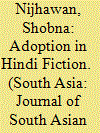

|
|
|
|
|
| Summary/Abstract |
This article examines gendered lives in vernacular fiction by focusing on the topic of child adoption as fictionalised in Hindi literature in late colonial India (1920s). It argues that non-conformance and non-normativity dominated the short stories selected for this article. The feature of non-conformance towards normative assumptions in middle-class Hindu society also concerned Hindi literary realism of the time more generally, especially when presenting a diversity of intergenerational relationships between women, men, children and youth within the family setting, as well as beyond. The narratives discussed here show how social norms set by caste, class, gender, religion and biology were surpassed when it came to imagined family constellations in the late colonial period.
|
|
|
|
|
|
|
|
|
|
|
|
|
|
|
|
| 2 |
ID:
175487


|
|
|
|
|
| Summary/Abstract |
The influential Tamil writer Pudumaippittan turned to the short story to theorise the relationship between literature and society in the late colonial era. He used the genre’s brevity to compress his portrayals of well-known female types—such as widows, prostitutes and goodwives—into singular emotional events. This enabled Pudumaippittan to evoke the wider debates about tradition and modernity that these female types commonly represented without affirming the social reformist positions to which they were linked. Through the short story, Pudumaippittan dislodged his portrayals of the Indian woman from existing gender norms, prompting a shift from social realism to modernist realism within the Tamil literary sphere.
|
|
|
|
|
|
|
|
|
|
|
|
|
|
|
|
| 3 |
ID:
175482
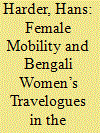

|
|
|
|
|
| Summary/Abstract |
Pioneering women’s periodicals in Bengali in the second half of the nineteenth century eloquently deplore the social confinement of women. Contesting this paradigm of female immobility, travelogues written by Bengali women simultaneously start to appear in the pages of such journals as Bāmābodhinıī Patrikā, Bhāratıī, Antaḥpur, etc., from the 1860s onwards. Unlike the famous nineteenth-century Bengali travelogues by Krishnabhabini Das and Svarnakumari Debi, these other writings have only very recently drawn attention. After laying out the state of the art, I will first introduce two of the established travelogues. Thereafter I will look at these still largely unknown writings, measure their significance for a women’s public and the Bengali literary sphere, and evaluate their setting in terms of gender and class. Shorter and less spectacular, the accounts in these periodicals are nonetheless a significant body of literature. They furnish detailed insights into the travel conditions and social framework women in those days experienced, and amply bear witness to the literary sentiments travelling inspired.
|
|
|
|
|
|
|
|
|
|
|
|
|
|
|
|
| 4 |
ID:
175489
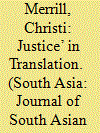

|
|
|
|
|
| Summary/Abstract |
The story of Kausalya Baisantry’s life of anti-caste activism is featured in Urmila Pawar and Meenakshi Moon’s Amhihi Itihasa Ghadavala (We Also Made History) in Marathi, and in her own book-length work of ‘autobiography literature’ written in Hindi as Dohra Abhishap (Doubly Cursed), but it is a speech Baisantry delivered in English as a college student activist that Pawar and Moon discuss as an example of ‘Sahityatun Prabodhan (Enlightenment through Literature)’. I trace connections between Pawar and Baisantry to show how multilingual these activist networks of ‘Sahityatun Prabodhan’ are, focusing specifically on Baisantry’s translation from Marathi of Pawar’s short story ‘Nyay (Justice)’, published in the leading Hindi literary journal Hans in 1991.
|
|
|
|
|
|
|
|
|
|
|
|
|
|
|
|
| 5 |
ID:
175488
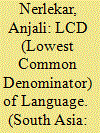

|
|
|
|
|
| Summary/Abstract |
The tumultuous politics of the post-Independence period in Bombay/Mumbai, and the creation of the linguistic states, released multiple and contradictory energies towards a re-examination of the Marathi language and its valence in linguistic, literary, social and cultural contexts. This essay employs the bilingual poetry of Arun Kolatkar and the Marathi-language poetry of R.K. Joshi to show the ways in which the sathottari poetry of Bombay engages with these socio-political questions of language and region by channelling the principles of concrete poetry and making the visual presence of the language (in its script, its lines, its presence on the page) a part of its meaning-making process.
|
|
|
|
|
|
|
|
|
|
|
|
|
|
|
|
| 6 |
ID:
175481
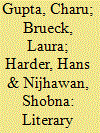

|
|
|
|
|
| Summary/Abstract |
This collection brings together nine essays, accompanied by nine short translations, that redraw the boundaries of literary histories both temporally and spatially. The essays, rooted in the humanities and informed by interdisciplinary area studies, explore multiple linkages between forms of print culture, linguistic identities and diverse vernacular literary spaces in colonial and post-colonial South Asia. The essays and translations foreground complex and politicised expressions of gender and genre in fictional and non-fictional print materials and thus draw meaningful connections between the vernacular and literature, the everyday and the marginals, and gender and sentiment. Collectively, they expand vernacular literary archives, canons and genealogies, and push us to theorise the nature of writing in South Asia.
|
|
|
|
|
|
|
|
|
|
|
|
|
|
|
|
| 7 |
ID:
175484
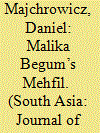

|
|
|
|
|
| Summary/Abstract |
Ostensibly, Muslim women in colonial India only rarely wrote travel narratives, particularly in Urdu. In truth, women’s travel writing in Urdu is anything but chimerical, but persistent archival and methodological limitations have led to the neglect and even irrevocable loss of this writing. A recalibrated approach to travel writing and archival practices divulges a vast corpus—but only if we attend to the specific ways in which women’s narratives were produced and circulated. This article offers a primary typology of the formats and fora most often employed by women writing in Urdu, including semi-private (but orally consumed) letters, family newspapers and women’s journals. Using extensive quotations from previously unknown sources, it reintroduces a forgotten corpus to the study of Indian history, literature, and gender studies alike.
|
|
|
|
|
|
|
|
|
|
|
|
|
|
|
|
| 8 |
ID:
175483
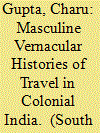

|
|
|
|
|
| Summary/Abstract |
This article focuses on vernacular travel writings on America and Europe by Swami Satyadev ‘Parivrajak’ (1879–1961), one of the first persons to systematically write travelogues in Hindi. I argue that Parivrajak’s travel literature was part of a colonised nation’s attempt to reclaim a space of freedom, forged through the carving of ‘perfect masculine bodies’, which embodied his ideals of beauty and pleasure. It was a performative, political act that inscribed gendered landscapes with a dialogue between East and West, slavery and freedom. The Hindu male’s subaltern masculinity had to be overcome through diverse means, all of which metaphorically interacted to shape Parivrajak’s writings.
|
|
|
|
|
|
|
|
|
|
|
|
|
|
|
|
| 9 |
ID:
175490
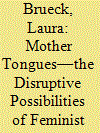

|
|
|
|
|
| Summary/Abstract |
This essay considers the methodological intervention of understanding a ‘mother tongue’ (matribhasha) as a gendered vernacular. It seeks to illustrate the subversive potential of the vernacular as a gendered lens though which we can understand the Dalit feminist critiques of caste hierarchies and Dalit and non-Dalit patriarchies, and the places they intersect. The essay considers the works of Anita Bharti and Meena Kandasamy, contemporary Dalit women authors who write in Hindi and English, respectively. Thus, this paper extends the definition of the vernacular beyond the confines of linguistic and regional specificity, allowing for a feminist reclamation of the term.
|
|
|
|
|
|
|
|
|
|
|
|
|
|
|
|
| 10 |
ID:
175485
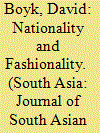

|
|
|
|
|
| Summary/Abstract |
The Persianate genre of the tazkira, or biographical compendium, typically concerns poets and Sufi saints, but a different approach is taken in Yadgar-e Rozgar, published in 1931 by Sayyid Badr al-Hasan, an aristocrat and honorary magistrate from Patna. Hasan focuses on the ordinary people—landlords and courtesans, doctors and bakers, lawyers and counterfeiters—who made up Patna’s social world as the city transformed from a provincial town into the capital of a new province. While many Patnaites celebrated these changes, Hasan was deeply ambivalent about the dilemmas of colonial modernity. He struggled to reconcile modernist ideals with his sense that older ways were essential to Patna’s cohesion and distinctiveness. As he worriedly put it, ‘Asian breeding’ had been replaced by a fickle disregard for social norms, as ‘nationality’ increasingly gave way to ‘fashionality’.
|
|
|
|
|
|
|
|
|
|
|
|
|
|
|
|
|
|
|
|
|